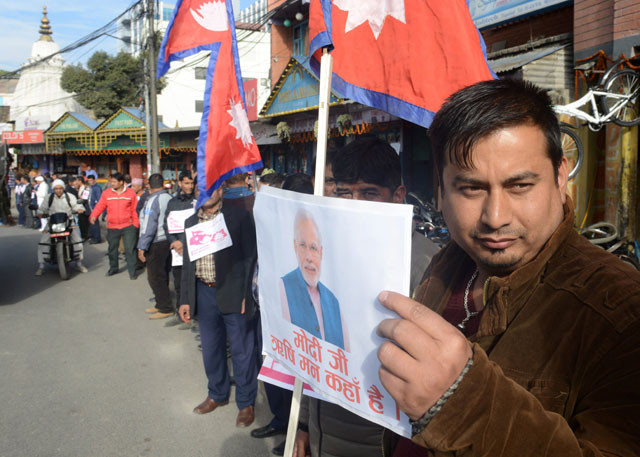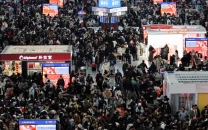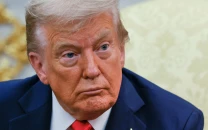Nepal shortages put millions of children at risk: UNICEF
Nepal's government accuses neighbouring India of orchestrating the blockade, a charge it denies

Nepalese activists hold up placards bearing the image of Indian Prime Minister Narendra Modi and join hands as they take part in a protest in Kathmandu on November 30, 2015, during an ongoing dispute between Nepal and India. PHOTO: AFP
The landlocked Himalayan nation has been struggling to cope with a sharp drop in vital supplies after protesters on September 24 began blockading a key border crossing to demand changes to a new constitution.
Nepal's government accuses neighbouring India of orchestrating the blockade, a charge it denies.
The disruption has caused crippling shortages of fuel and medicine, leaving aid organisations scrambling to deliver relief to homeless quake victims seven months after the April 25 disaster killed nearly 9,000 people.
Nepal arrests 38 in strike against 'Indian border blockade'
"More than three million children under the age of five in Nepal are at risk of death or disease during the harsh winter months due to a severe shortage of fuel, food, medicines and vaccines," UNICEF, the UN Children's Fund, said in a statement.
More than 200,000 families are still living in temporary shelters at an altitude above 1,500 metres, it said.
"The risks of hypothermia and malnutrition, and the shortfall in life-saving medicines and vaccines, could be a potentially deadly combination for children this winter," said Anthony Lake, UNICEF's executive director.
"They could now be facing a new disaster -- without adequate food, protection from the cold, or health care."
Nepal rations fuel as protesters blockade Indian border
The shortages have also resulted in fewer medically-supervised deliveries due to limited ambulance services, putting the lives of some 125,000 expected newborns at risk over the next two months, the agency said.
"The plight that children and their families are facing in the country has been worsening by the day and will deteriorate further in the winter months," said Karin Hulshof, regional director of UNICEF for South Asia.
"UNICEF urges all sides to address the restrictions on essential imports of supplies to Nepal. There is no time to lose," Hulshof said.
Scores of trucks have been stranded at the Birgunj border checkpoint in southern Nepal, where protesters from the Madhesi ethnic minority have blocked a bridge for over two months.
Movement across other border checkpoints has also slowed to a crawl, prompting Nepal's government to accuse India -- which has criticised the new constitution -- of imposing an "unofficial blockade".
New Delhi has denied the charge and urged dialogue with the Madhesis, who share close cultural, linguistic and family links with Indians living across the border.



















COMMENTS
Comments are moderated and generally will be posted if they are on-topic and not abusive.
For more information, please see our Comments FAQ